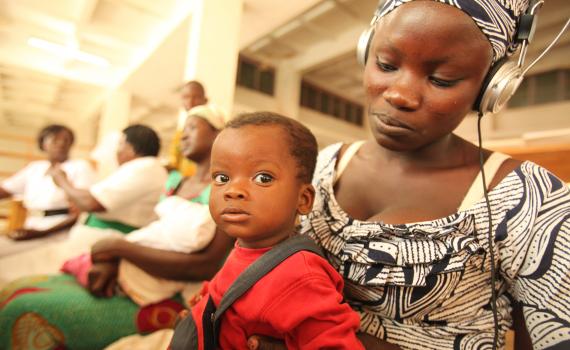
Community need
Accurate statistics for maternal mortality (death through complications related to pregnancy and childbirth) are hard to come by in rural Ghana, because unknown numbers of women and adolescent girls are quietly buried, without registration, when they die. However, there is general agreement that the number of maternal deaths – estimated at between 1,400 and 3,900 a year – is too high.
Every month, the Northern Regional Library in the town of Tamale hosts lectures to raise awareness about the role of information and communication technology (ICT) in development. After one lecture, health workers reported that pregnant women were not visiting clinics regularly, and so were missing out on vital check-ups and advice. They asked the library for help.
The innovative service
Northern Regional Library’s Technology for Maternal Health service helps reduce maternal mortality by improving pregnant women’s access to vital health information.
With support from the EIFL Public Library Innovation Programme (EIFL-PLIP) in 2012/2013, the library used computers, the internet, mobile phone text messaging (SMS) and radio to access and disseminate information. The library also hosted maternal health events at which health workers could meet women and talk about their concerns and fears.
The library’s main partners were Savana Signatures, a local NGO that promotes the use of information and communication technology (ICT) for development, three local hospitals and the international health NGO, Mobile Alliance for Maternal Action (MAMA), which creates maternal health messages. A team of health workers from the three hospitals revised MAMA’s messages to make sure they could be understood by women in northern Ghana.
The library organized three public health events where health workers interacted with over 180 community members.
EIFL-PLIP PROJECT TIMELINE
May 2012 - April 2013.
Achievements and Impact
In less than a year, the library trained 15 health workers to use computers, to conduct online health research and to access the pre-loaded material. They also sent weekly text messages to 94 expectant mothers. Three health events at which over 180 community members interacted with health workers, and a maternal health campaign over northern Ghana’s most listened-to station, Radio Savannah, ensured that non-literate women also received health messages.
The service won recognition, and the library’s partner organization, Savana Signatures, received major funding to expand the service to include four more districts in northern Ghana.
additional resources and media
Read about this innovative public library service in the Bill and Melinda Gates Foundation blog, Impatient Optimists (impatientoptimists.org/Posts/2013/11/How-a-Modern-Library-Keeps-Mothers-Healthy-in-Rural-Ghana).
Read a two-page study about the service. PLIP-HEALTH





